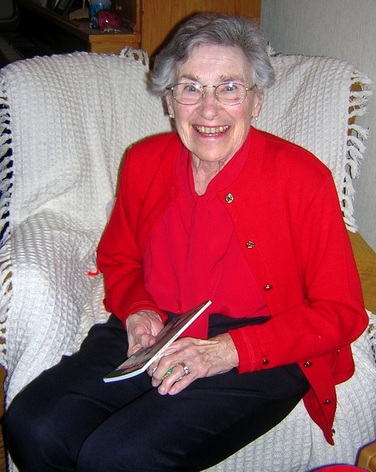Mom was many things—a bookseller, a trainer of pilots in the Navy in WWII, a volunteer, a baker, a pillar of her Baptist church—but above all, she was a woman who gave us kids unconditional love and support. When I came home in 4th grade and said I wanted to play violin in the school program (so I could get out of math class with my best friend), of course I could. When it was determined that I needed a violin of my own, she located one for me through her network of friends. When I wanted to quit the next year, she gently asked me to give it another year. I never wanted to quit again, and sometimes I wonder if she regretted not letting me do so when I asked!
A couple of years later, I started private lessons. She never bugged me about practicing—music was my thing, and it was my responsibility. But she sewed up long black skirts for me, and was at every school concert, no matter how dreadful the last one had been. When I needed a better violin, we went up to Montreal and found a nice little Heberlein for $200, not an inconsiderable sum at the time for a “hobby.”
After my father died, and I was college-bound, she let me go ahead as a music major, a move he had opposed. Again, she was at every concert, and our home became a rest stop for my college friends, who often came home with me for Sunday or holiday dinners. The “Janet Broadcasting System” got most of her church to my senior recital for a full house, as well as a bona-fide church-lady cookies and punch reception.
Her interested support never flagged. She had played the piano as a girl, but never acted like she knew about music. I remember coming down from a practice session one time in particular. She looked up from snapping beans or cutting up apples and asked, “That was pretty. What do you call it?” I could only reply, “I call it a G major scale, Mom.” I think the only time she was at a loss for a compliment was the summer I spent learning fingered octaves and upbow staccato. After one particularly hideous practice, she just looked at me, trying to find something positive to say. We both just started laughing.
Mom came out to visit the first summer I went to Aspen. She was delighted to see Dorothy DeLay and Itzhak Perlman in the flesh, after having heard about them for so many years. She visited me at Eastman, and came to studio class. When Peter Salaff asked if she had any comments for the players, she just laughed and assured everyone that they sounded wonderful. She was so tickled that he had asked her, and over the years giggled incredulously whenever it came up in conversation.
Of course she was very happy when I got a college teaching job right out of graduate school, and though I’m sure she was less than happy when I quit a few years later, she never said so. After a year working on my doctorate left me disgusted enough to pack my violin up, send it home, and not touch it for six months, again, not a word of remonstrance. She welcomed me back home for a year, and I was not the most gracious guest. When I decided I wanted to do this violin thing after all, she listened patiently to me knocking the rust off my fingers as I geared up for more graduate school auditions. The program and teachers at FSU agreed with me much more, and again there was rejoicing when I landed the job at Kansas State. There was also confusion when she told a college friend that I had moved to Manhattan—it was clear in her mind that she meant Manhattan, Kansas.
She thought the anthology was great and was so proud of my “books.” Her friends knew everything about me and remembered what I’d been up to better than I did. Mom had lots of friends. She always said that when she felt bad, her remedy was to do something nice for someone else. In her 90’s, she was still taking care of others in the “Elder Building” of the apartment complex in which she lived. She sent birthday and get well soon cards, baked custard for a woman having chemo who couldn’t eat anything else, and shared many laughs and probably a few tears with her neighbors.
My sister-in-law wrote a note on the back of the autopsy request form, telling the doctors a little about the woman whose body they were going to be working on. One phrase stuck out in particular: “She never said or did an unkind thing in her life.” I don’t know too many people of whom that could be said. Desmond Tutu? Nelson Mandela? Mother Teresa? Certainly not me. But it was 100% true of Janet Cooper.
A few months after she died, a beautiful violin pretty much showed up at my door. I had vowed to be mature and responsible with my inheritance, and certainly not to look at instruments. But here this one was, and I was in love from the first note. I thought about it, had great internal debates, and finally decided that the purchase would be her parting gift of support. I feel a drop of her love in every note I play.

 RSS Feed
RSS Feed